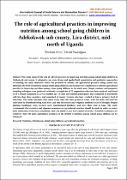The role of agricultural practices in improving nutrition among school going children in Adekokwok sub county, Lira district, mid-north of Uganda
Abstract
This study explored the role of selected practices in improving nutrition among school going children in Adekokwok sub-county. It adopted a case study design and applied both quantitative and qualitative approaches in handling the study objectives which was premised to identify the agricultural practices being carried out; determine the level of nutrition among school going children; and examine the contribution of selected agricultural practices in improving nutrition among school going children in the study area. Simple random; and purposive sampling techniques were preferred to identify a sample size of 72 respondents who were later analyzed and found to be a female dominated (72.5%), youthful (25-34 year) and married participants that comprised of households with less than three members, and comprised of mainly farmers who have reached at least a primary level of education. The study concludes that cereal crops were the most produced crops, with the main tool used for cultivation by households being hand hoes; and they did not use any irrigation methods in case of drought. Despite planting traditional seeds, farmers used manufactured fertilizers and store their food in bags. The study recommends that extensive and vigorous awareness on agricultural practices should be made in order to ensure basic orientation of the local community, and Lira district Local Government form the “Nutrition Ordinance for Children” that will guide agricultural practices in the district if nutrition among school-going children can be enhanced.
Collections
- Research Articles [139]

